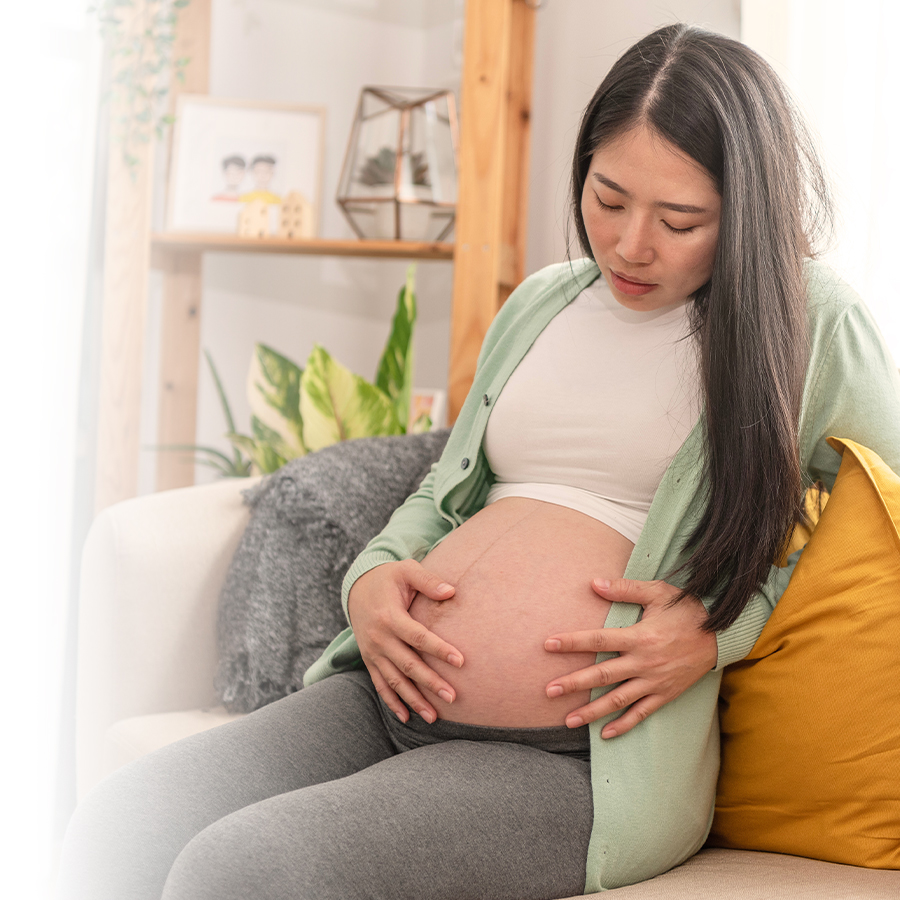Pregnancy is a wonderful time in a woman’s life, but it sometimes has certain drawbacks. Constipation in one of them.
Constipation: a definition
It is estimated that about 40% of pregnant women experience constipation at some point during pregnancy. Furthermore, mothers-to-be who already experienced constipation before becoming pregnant are likely to continue having it, or having it more, during pregnancy.
It is healthy to have bowel movements when the urge is felt and to pay attention to their frequency. However, some people worry unnecessarily about the frequency of stool evacuation. They may get the impression that decreased regularity is a sign of illness, yet, in most cases, it is not.
How exactly is constipation defined? This can be difficult, as defecation habits (having a bowel movement) can greatly differ from one person to the next. In general, intestinal transit is considered normal when a bowel movement occurs between twice a day to once every three days.
We speak of constipation when the following signs and symptoms are present:
- three stools or less a week or a significant decrease of the usual frequency
- exertion is needed to defecate
- pain during defecation
- hard and dry stools, and
- sensation of incomplete evacuation after a bowel movement
The causes of constipation during pregnancy
Pregnant women are more prone to constipation. This can be explained by a range of factors, such as:
- compression of the intestines by the uterus
- the presence of hemorrhoids
- poor fluid intake due to nausea/vomiting
- taking vitamin supplements containing iron or calcium
- hormonal variations that slow down digestion
- decreased physical activity (even more so at the end of the pregnancy)
- nervousness/anxiety caused by the imminent arrival of the baby
Lifestyle changes
The prevention and treatment of constipation during or after pregnancy is based above all on non-medicinal measures. Making simple lifestyle changes can really help to reduce symptoms. Here is some advice to this end.
- Gradually increase your daily fibre intake up to 25 to 30 grams a day. To achieve this, eat more fibre-rich foods:
- fruits (apples with the peel, pears, dates, figs, etc.)
- vegetables (Brussels sprouts, raw carrots, spinach, corn, broccoli, etc.)
- legumes (dry beans, lentils, kidney beans, dry peas or chick peas, etc.)
- nuts (almonds, pistachios, walnuts, etc.) and grains (soybean, sesame, flax, chia, etc.)
- whole wheat foods (bread, cereal, crackers, brown rice, oatmeal, etc.)
- If you’re not sure you can meet your daily fibre needs through diet, you can consider taking natural fibre supplements. Speak to your pharmacist before purchasing this type of product.
- Exercise regularly (walk, swim, cycle, etc.). Go at your own pace.
- Try to set some time aside in your day to have a bowel movement, if it’s possible.
- Don’t repress your urges to have a bowel movement.
Treatments for constipation
If lifestyle changes are insufficient to eliminate constipation, you can use medication. Several over-the-counter medications sold at the pharmacy have proven safe and effective in relieving constipation in pregnant women. Others must be avoided for various reasons, such as the concern that they will trigger contractions (e.g., castor oil).
The medications considered to be safe come in various formats: powder, tablets, capsules, liquid, suppositories, etc. The range of products available is so wide that it can be difficult to choose from. The best thing to do is to speak to your pharmacist. They can recommend the best-suited product for you (and your baby), and explain how to use it properly.
You should see a doctor if:
- you experience sharp abdominal pain
- you are unable to evacuate stool
- you have been constipated for at least three weeks (intermittently) and the situation does not seem to be getting better despite applying the above-mentioned measures
- you have unusual or alarming symptoms (fever, headaches, vomiting, bloody stools, difficulty eating, weight loss, etc.)
- you have a personal or family history of bowel disease (colorectal cancer, Crohn’s disease, ulcerative colitis, etc.)
Don’t hesitate to speak to your pharmacist for additional information about constipation during pregnancy and its treatment.


